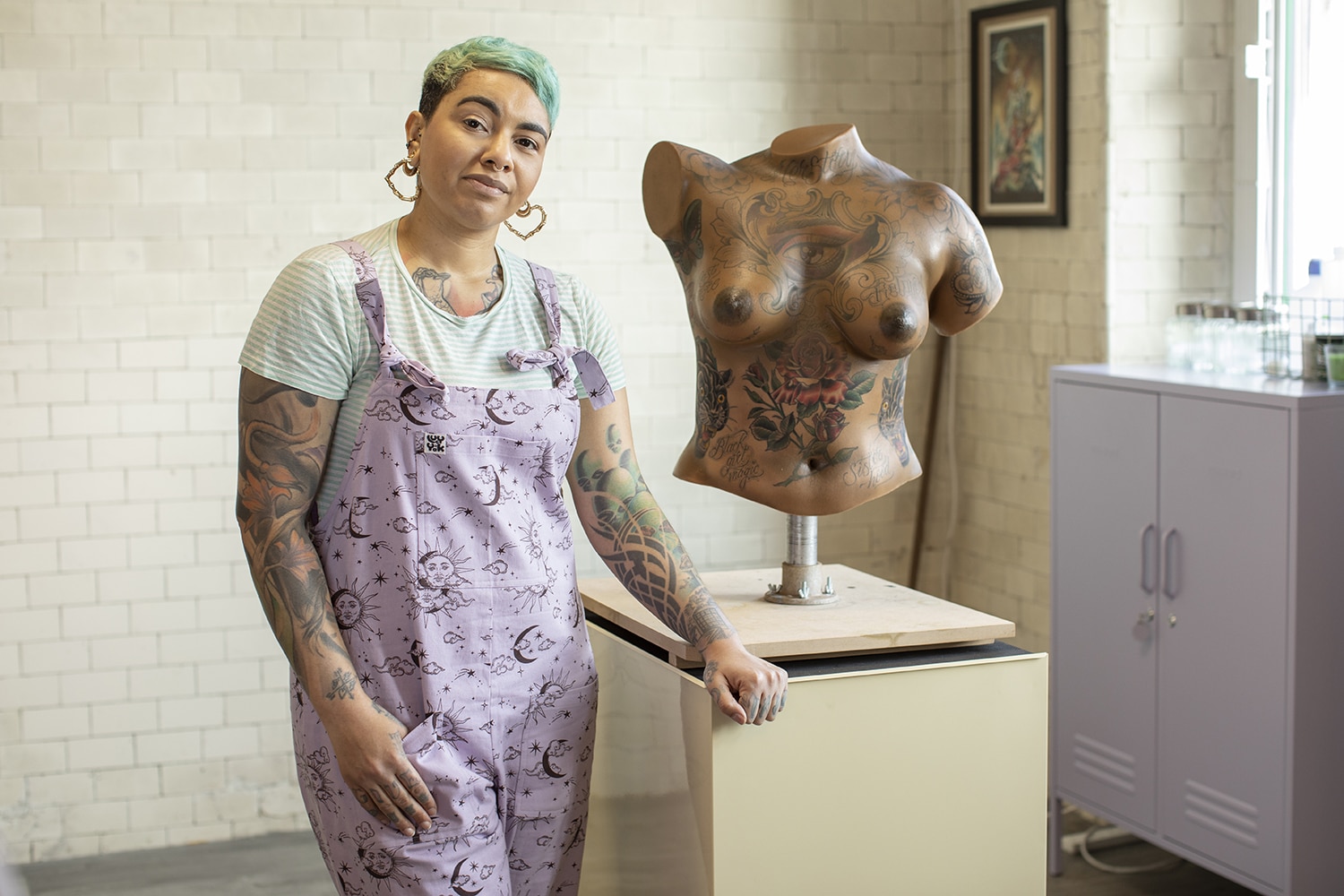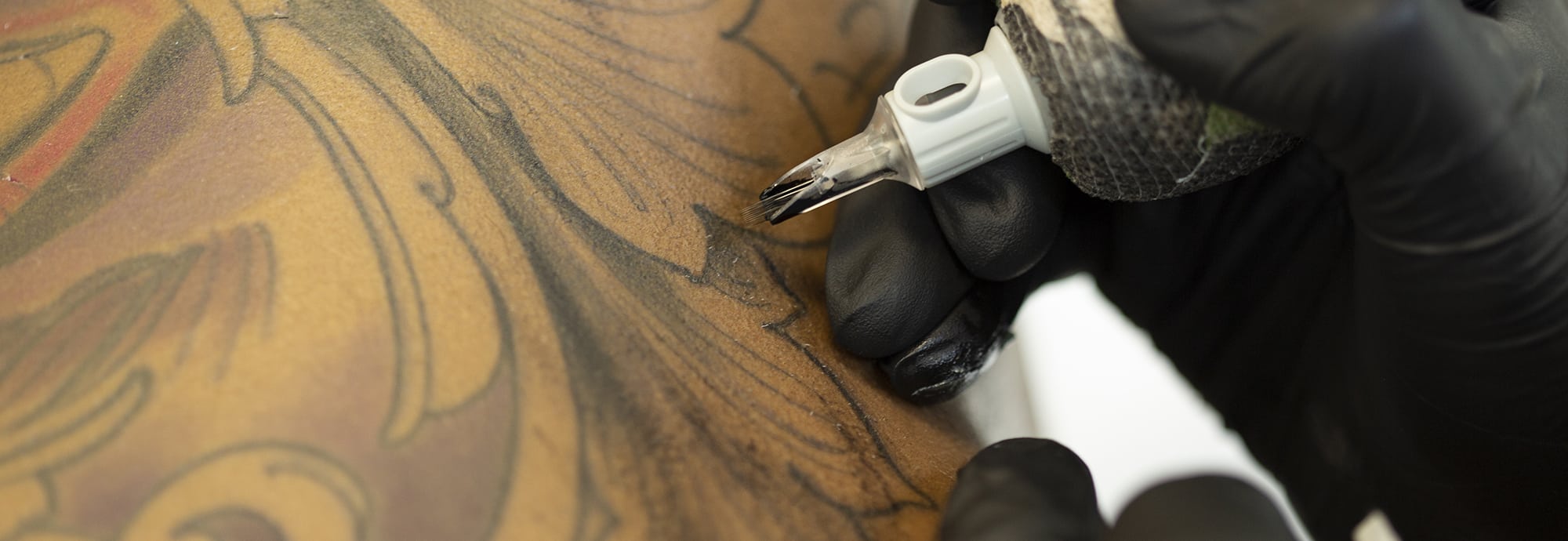This blog post contains sculptural representations of male and female nudity, including body parts.
On Friday 24 June British Tattoo Art: Reclaiming the Narrative opens at the Museum. Featuring 14 pieces of newly commissioned work created by 14 Black and POC tattoo artists, all working in the UK today, these new artworks represent a celebration of contemporary tattoo art on Black and brown skin.
The installation forms a powerful artistic response to our critically-acclaimed 2017 exhibition Tattoo: British Tattoo Art Revealed, which was the largest gathering of real objects and original tattoo artwork ever assembled in the UK.

Charissa Gregson / Rizza Boo alongside her piece Starry Crown.
Reflecting on the original exhibition approach, which was ground-breaking in challenging deeply held cultural stereotypes about tattoos and tattooing in terms of class and gender, the installation responds to, and highlights, the current conversations around representation taking place in museums and galleries, as well as in the tattoo industry. These works have been commissioned to address omissions and cultural biases contained in the narrative of the 2017 exhibition, and are intended to be a direct intervention into a wider, necessary and vital conversation around diversity of representation – historical and contemporary – in the story of British tattoo art.
Guest curated by Alice Snape, and created in partnership with lead artist Charissa Gregson aka Glasgow-based Tattoo artist Rizza Boo, of Shadow Work Tattoos, British Tattoo Art: Reclaiming the Narrative will be displayed as a thought-provoking and powerful challenge to our own cultural decision-making around the original 2017 show.
Additional designs on synthetic skin plaques including works from:
- Manni K, Jolie Rouge
- Natasha Jackson, Prophecy Tattoo and Piercing
- Lord Montana-Blue, The Good Fight Tattoo
- Sarah Louise Powell, Neon Wolf Tattoo Studio
- Samantha Bee, INKLOUNGE Tattoo Studio
- Rakhee Shah, Xotica Tattoo Company
- Nish Rowe, Blu Xion Tattoo
- Jade Clark, Heart of Glass Tattoo
- Samuel Ayobami Paul, Artkilledme
- Ash Tyson, Ouroboros private studio
- Yasir, Fake Skin Tattoo
- Jezz-lee Wood, Samsara Tattoo Parlour
- Pedro, Grey Area Custom Tattoos
Charissa Gregson, Lead Artist Statement:
“Following the brutal killing of George Floyd in 2020, people all over the world have been engaging in more conversations about social injustice, police brutality, institutional racism and anti-Blackness.
We saw this echoed through the tattoo community with clients and tattooers sharing some of their experiences of anti-Blackness within the industry, ranging from subtle microaggressions to outright racism. There were conversations about the lack of appreciation and representation of black artists, insensitivity when tattooing cultural subject matter, the harmful effects of whitewashing photos of clients to fit a specific aesthetic and the general lack of knowledge and misinformation around tattooing darker skin.
We know that representation matters. This exhibit feels like an important addition, showcasing the work of Black and POC tattooers, making sure we are included in this particular record of tattoo history. It is a small sign of progress that the plaques and silicone arms used in this project are now available in a slightly more diverse palette, which one would hope will continue to expand. Offering a wider range of colours, skin tones, so that even more people would see a representation of their skin included in an exhibition like this.
When asked to contribute to this project, it was obvious to me that we must get more artists involved. A single piece by one artist would only be the illusion of diversity and give a false impression of the cultural and artistic diversity that actually exists in our communities. Holding space for more artists and giving platform to their creativity, gives a truer look at who is tattooing in Britain right now. With this project we seek to disrupt and challenge some of the misinformation, give voice to the individual artists and allow us to share some of our collective story.”
Richard Doughty, Director, National Maritime Museum Cornwall, says:
“The Museum is immensely proud of the achievements of the original Tattoo: British Tattoo Art Revealed. It was ground-breaking in challenging deeply held cultural stereotypes about tattoos and tattooing, particularly in terms of class and gender. However, the Museum also acknowledges flaws in the exhibition development.
With Tattoo, we have learnt a powerful lesson for all our future work: we cannot assume that we have all the answers, all the knowledge and understanding, when it comes to different histories or the representation of different cultural perspectives. At its heart, it is a question of who we include – or exclude – in the creation of exhibitions. We need to listen more, to engage with more people before an exhibition opens. Only this way can we hope to lessen the impact of unconscious bias or cultural insensitivity. We may not always get it right for everyone, but we can – and we will – do better.
These beautiful, moving and thought-provoking works of art show what can be achieved in the re-shaping of a historical narrative when the Museum opens up its cultural and creative process to include different lived experiences and more diverse cultural perspectives.”
British Tattoo Art: Reclaiming the Narrative runs until Sunday 16 April, 2023. Find out more about the current display of Tattoo: British Tattoo Art Revealed.



